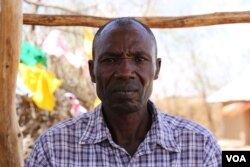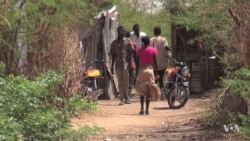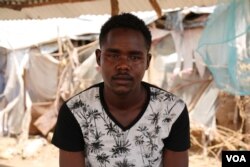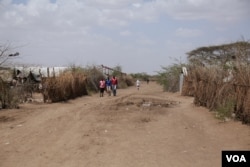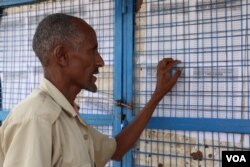President Donald Trump's travel ban and its legal challenges have caused much anxiety and confusion in the Kenyan refugee camps of Kakuma and Dadaab, where those slated for resettlement in the United States are unsure of their futures.
The president has argued the temporary measures are necessary to keep the country safe from terrorism. Refugee organizations respond that refugees are already vigorously vetted.
Here in Kakuma, 48-year-old Michael Abukassim Kuku, a refugee from Nuba, Sudan, was scheduled to fly to the refugee-processing center in Nairobi on January 30. From there, he was to join his wife in Des Moines, Iowa. But the ban prevented his departure.
"I really felt bad and it really affected me," Kuku said. "When I was told that I was leaving, I felt very happy. So when I was told the ban was there, and we weren't supposed to go, then that really gave me a hard time."
Kuku received a phone call that he is to report to the International Organization for Migration (IOM) office on February 17 for his flight to Nairobi. He is hopeful that this time, he will be successful.
Another Sudanese refugee, 24-year-old Abdulaziz Yassir Yahya, from Darfur, was scheduled to fly to Nairobi on January 30 for processing, and then to his new home in Tucson, Arizona. But he remains in Kakuma for now.
"I want to go to America because my homeland is still in war," Yahya said. "And we are just living with no hope. So when I go to America, I might be able to go to school."
Ahmed Omar Bihi has lived in refugee camps since 1992, when he fled warfare in Somalia. He stayed in Dadaab until 2013, when he was transferred to Kakuma. Bihi was told to expect his U.S. resettlement before March. He is worried, but has not lost faith.
"My hope is that Mr. Trump is changing his mind and law will prevail in order to release us from this harsh life," Bihi said.
Though a U.S. federal judge put the ban on hold, refugees ready to fly to the United States have also been sent back to the Kakuma and Dadaab refugee camps.
Somali Qaali Abubakar Mohamed is one of them. She says she was scheduled to leave for her new home in St. Louis, Missouri, on February 1. Instead, she was sent back to Dadaab.
"But we do not know the reason why the people are doing this, this discrimination," Mohamed said.
"We are following very closely all the developments going on in the U.S. and the situation is obviously fluid, and things are changing constantly," said Yvonne Ndege, UNHCR Kenya spokesperson. "But UNHCR Kenya's understanding is that we are OK for the time being to continue resettling refugees in the United States while the legal issues in the United States are resolved."
A request for response from the IOM was not immediately returned.
A State Department spokesperson said the "processing of refugees is ongoing in Nairobi, including for travel to the United States."
The ban suspended for 90 days entry into the United States by citizens from seven countries where terrorist groups are active, including Somalia and Sudan. All refugees needed to wait 120 days, with the exception of Syrians, who would be barred from entry indefinitely.
But for these refugees in Kenya, they hope the legalities can be sorted out and they can soon begin their lives in the United States.





